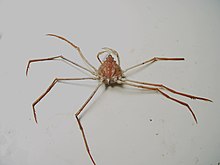
Alphonse Milne-Edwards was a French mammalogist, ornithologist, and carcinologist. He was English in origin, the son of Henri Milne-Edwards and grandson of Bryan Edwards, a Jamaican planter who settled at Bruges.

Siphonostomatoida is an order of copepods, containing around 75% of all the copepods that parasitise fishes. Their success has been linked to their possession of siphon-like mandibles and of a "frontal filament" to aid attachment to their hosts. Most are marine, but a few live in fresh water. There are 40 recognised families:

Majidae is a family of crabs, comprising around 200 marine species inside 52 genera, with a carapace that is longer than it is broad, and which forms a point at the front. The legs can be very long in some species, leading to the name "spider crab". The exoskeleton is covered with bristles to which the crab attaches algae and other items to act as camouflage.

Palicus is a genus of stilt crabs in the family Palicidae.
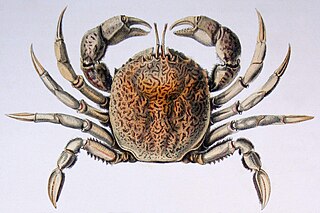
Belliidae is a family of crabs of the order Decapoda.
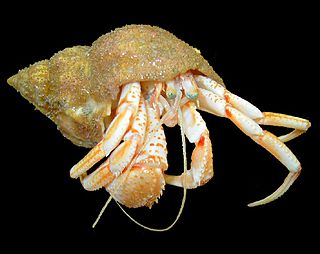
The Paguridae are a family of hermit crabs of the order Decapoda. The king crabs, Lithodidae, are now widely understood to be derived from deep within the Paguridae, with some authors placing their ancestors within the genus Pagurus.

Paguristes is a genus of hermit crab in the family Diogenidae. It includes the following species :
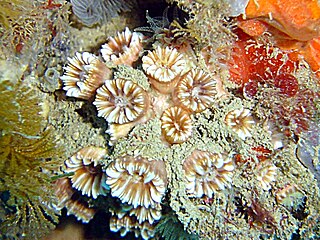
The Caryophylliidae are a family of stony corals found from the tropics to temperate seas, and from shallow to very deep water.

Acanthastrea is a genus of large polyp stony corals in the family Lobophylliidae. The colonies are massive and usually flat. The corallites are either circular or angular in shape. The septa are thick near the wall of the corallite, becoming thin near the columella, and have tall teeth. The polyps are extended only at night.

Munidopsis is a genus of squat lobster. It is the second largest of all the genera of squat lobsters, after Munida, with over 200 species. Its members are mainly found on continental slopes and on abyssal plains. A few fossil species are also known, including specimens from the Campanian (Cretaceous).

Munida is the largest genus of squat lobsters in the family Munididae, with over 240 species.

Panopeus is a genus of crabs, containing these extant species:

Astrocoeniidae is a family of stony corals. The family is distributed across the tropical and subtropical oceans worldwide.

Pisinae is a subfamily of crabs in the family Epialtidae, comprising the following genera:

The Panopeidae are a family containing 26 genera of morphologically similar crabs, often known as "mud crabs". Their centers of diversity are the Atlantic Ocean and eastern Pacific Ocean.
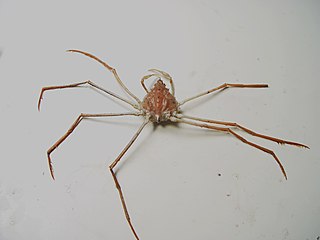
Inachoididae is a family of crabs originally erected by James Dwight Dana in 1852. It was not recognised as a valid family until the early 1980s. Its members closely resemble those of the family Inachidae, and the Inachoididae could be recognised as a subfamily of that family.
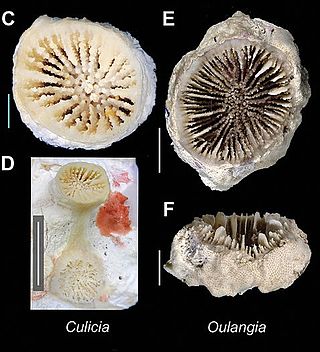
Rhizangiidae is a family of stony corals in the order Scleractinia. This family is closely related to Oculinidae. Members of this family are non-reef building corals and reproduce from stolons. The corallites are small and the septa are simple.

Dendrophyllia is a genus of stony cup corals in the family Dendrophylliidae. Members of this genus are found at depths down to about 900 metres (3,000 ft). They are azooxanthellate corals, meaning that they do not contain symbiotic photosynthetic dinoflagellates as do many species of coral.

Plesiastraea is a genus of corals. It is the only genus in the monotypic family Plesiastreidae.

Xylopagurus is a genus of hermit crabs within the family Xylopaguridae. There are currently 4 species assigned to the genus.
